ICI March and April Assembly Meetings were Held as Video Conference
- 01.04.2020
- News
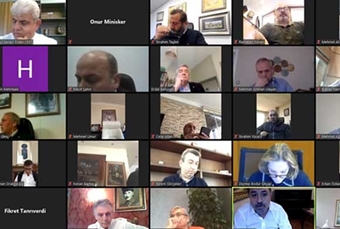
March-April Assembly Meetings of Istanbul Chamber of Industry were held as video conference on April 1st, 2020 because of the Coronavirus pandemic. The main agenda of the ICI Assembly chaired by Zeynep Bodur Okyay, ICI Assembly President was “The Impacts of Covid-19 on the Industry”. In the meeting for which great majority of the assembly members participated, industrialists from nearly all sectors shared their opinions and experiences about this challenging period. And they listed their solution suggestions.
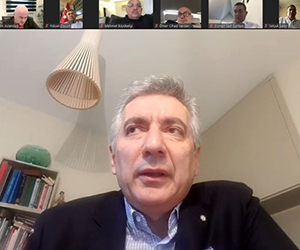
The March-April Assembly meeting was opened by Zeynep Bodur Okyay, the ICI Assembly President. When opening the meeting, Okyay said that:
“We are realizing a critical Assembly meeting. We all have problems and selective precaution reserve against the Coronavirus. We are going through a period that might disturb the peace in our working life. We are aiming to come up with a suggestion set that might alleviate our problems in this Assembly meeting. Our industry has technological transformation, resource and investment problems. It is of crucial importance to keep human resources, not cause employee and employer to face off against each other, enable business facilities to maintain their operations and protect our markets. We need to take the correct precautions today. Anything which might give harm on the sense of justice should be avoided in state support. We should comprehend and interpret the post-pandemic period well. We have to analyze the process well and get ourselves prepared. Only in this way, we can keep our production capacity.
Okyay, the Deputy President of ICI Assembly gave the floor to Erdal Bahçıvan, ICI Board of Directors President to make his speech. Erdal Bahçıvan, ICI Board of Directors President who made a speech for the Assembly Members said that the precautions taken against the Coronavirus pandemic which started as a health problem brought the economical problems and crisis as well. Stating that this crisis is very different from the previous crises, Bahçıvan mentioned that previous ones were the financial crises, therefore, the precautions taken were aimed at overcoming the financial crises. Telling that the current situation is very different, Bahçıvan expressed that countries turned themselves and trade has become impossible to be carried out, demand has been shrank even stopped. Bahçıvan said that protecting the human life and enabling the daily life to be sustainable is the most fundamental and prioritized goal.
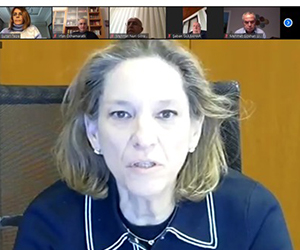
Saying that all of these will cause them to be faced with a great transformation, Bahçıvan drew attention that things will be different for everybody from social life to education, production to logistics. Pointing out that the approaches which prioritize the health of society and living life as a whole will come to the fore, Bahçıvan reminded that opinions and demands in this term started to be mentioned in the global scale. Stating that approaches to produce global solutions in collaboration will be respected instead of saying “first me” against global problems, Bahçıvan underlined that focusing on radical and sustainable solutions will gain value in the middle and long term, instead of short-term, one-sided and central bank-based solutions such as monetary expansion, low interest rate that only save the day but do not benefit anyone in the long term.
Saying that the health of the employees who are committed themselves to produce at industrial facilities is of vital importance for them, Bahçıvan noted that the precautions in this sense should be applied in full and constantly. Congratulating all industrialists and employees who do not lose their enthusiasm to produce under extremely challenging conditions and carry out both export and import activities, Bahçıvan said that they put a great effort which should be appreciated.
Mentioning that two subjects are of great importance when considering all of the opinions and problems notified by the Assembly and Profession Committees, Bahçıvan noted that sacrifices and expectations should be equally distributed in this kind of challenging periods. Bahçıvan stated that only in this way, the societies can be motivated in the struggle which resembles a war in some aspects, and they can strive in peace and mind.
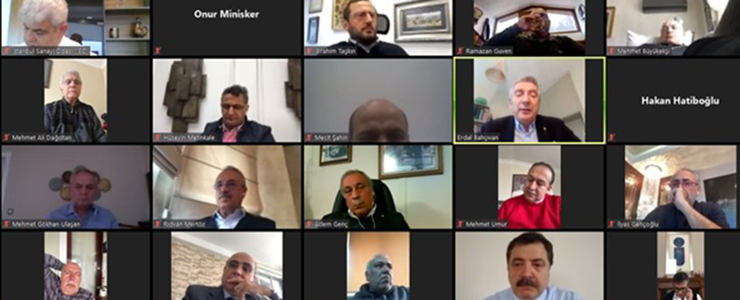
Underlying that the sectoral distribution of force majeure is currently the most adversely affecting issue on the industrial base and claiming that sectoral distribution of force majeure based on NACE does not comply with the approach he just mentioned, Bahçıvan drew attention that governments in the world constructed the economic support packages to provide equal support for everyone. Emphasizing that the Turkish industry has not right to make discrimination over NACE in such a challenging period, Bahçıvan said that approaches and applications that might cause separation and uneasiness among the interrelated and intertwined sectors should be specifically avoided and all manufacturing sectors should be included in the force majeure scope without any exception.
Stating that the second subject is the short time working allowance, Bahçıvan expressed that: “Two women who are working in the same factory paid 450 days of premium and 375 days of premium subsequently. They work in the same line and they are paid with the same salary. One of them is said that she can use the short time working allowance for having paid for 450 days of premium while the other cannot. This is like making a discrimination in a ship which is about to sink and saying that the passenger who has got the ship one hour earlier can get on the lifeboat while the other cannot since she has got the ship just one hour later than the other. It is not fair. This injustice should be eliminated without any delay, and all day restrictions regarding the short time working allowance should be removed.
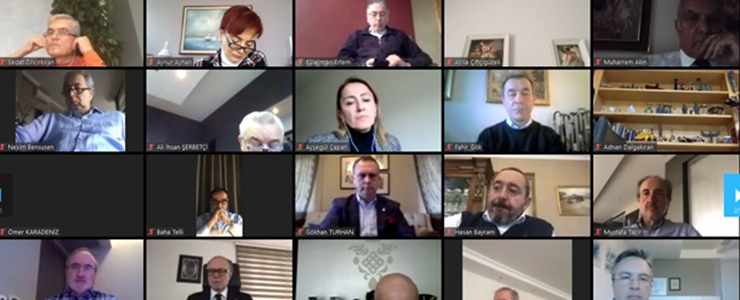
And Bahçıvan listed the important subjects they discussed:
- The receivables of private sector from the state, especially VAT receivables, should be paid promptly, and our VAT receivables should be used as a surety instrument.
- KGF limits should be opened without any delay, regardless of the past usage and limits of the companies. Unfortunately, those who paid the their loans within KGF scope regularly in the past but could not complete the payment in full yet cannot be provided with limit while those who made their loans structured can be. This unfair approach should be removed.
- Confusion and injustice caused by the last check regulation in the market should be eliminated.
- Our industry should be provided with energy support especially the sectors which continue to operate, electricity-natural gas payments should be postponed for the energy-based sectors for 6 months and other sectors should be provided with the opportunity to pay with installment.
- The logistics needs of the sectors that continue to operate should be met without any interruption. And opportunistic approaches encountered especially in air and sea freight transportation should be prevented.
- Temporary tax payment should be removed.
- Public banks are still exposed to a heavy load. Considering that the working hours are shortened, and the number of employees are reduced, the opportunity to make the tax payments to the private banks for a particular time period should be brought.
- The scope oft he supports provided in Eximbank credits should be extended.
- Delays experienced in the export durations in customs should be eliminated.
- Stock financing process to be provided for exporters should be clarified.
Informing that they are focusing on the researches conducted by TOBB so that “Breath Credit” which was applied in the previous years under the coordination of TOBB, the roof organization and which provides an important financing opportunity to the firms with its reasonable interest rate compared to the market conditions, Bahçıvan said that they will contribute to the credit as the Chamber like they did in the past. Besides, Bahçıvan stated that the first installment of the subscription payment that the firms would make for the Chambers in June is delayed to October without imposing any delay interest.
Additionally, Bahçıvan stated that they organized social responsibility activities and efforts and continued:
“We contribute to the supply and local production of health materials and equipment. We contribute to the necessary medical materials and devices by working in close contact with the T.R Ministry of Industry and Technology, Governorship and public hospitals located in Istanbul. We donated 10-unit respirators to Çapa Medical Faculty. We also provide medical materials and equipment with the contributions of industrialists, including our Assembly and Professional Committee Members. We initiated the production process of masks, aprons, overalls and face shields in our vocational high schools for which we are responsible. We started an initiative to enable the medical devices required in high quantities to be produced domestically. We are creating an inventory by making announcements for our all members who can contribute and get in direct contact with the members who can conduct production.”
Reminding that they are going through a challenging period, Bahçıvan expressed that: “However, the day is not the day of pessimism. We will overcome this challenging period in collaboration all together. We should go on without turning our backs to the precautions, maintaining our hope, sharing and embracing the life.”
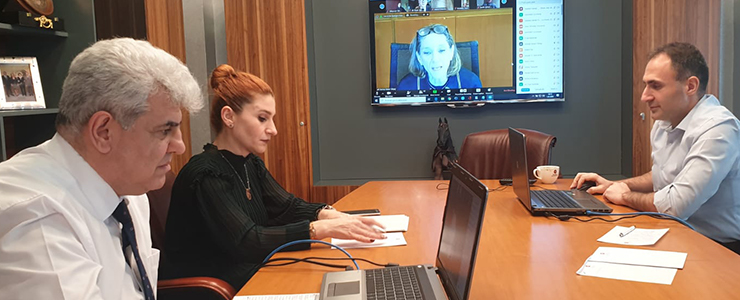
ICI Assembly Members shared their problems regarding the Coronavirus pandemic and its impacts on the industry and their solution suggestions. Zeynep Bodur Okyay, ICI Assembly President listed the demands at the end of the meeting:
“Considering all the speeches, four problem titles are coming to the forefront. Financing, labor force market, export and public receivables. In addition to state banks, private banks should initiate their support mechanism in financing. Interest-free credits should be provided and KGF should be activated. IŞKUR supports should be commissioned in the labor force market and short time working allowance should last for 6 months and worker salaries should be guaranteed by the state for a particular time period. Transportation controls in the export and problems in the custom should be solved. There are demands for postponing the bankruptcy and execution in public receivables and other energy-related demands.